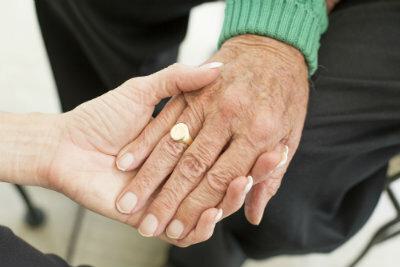Volunteers Provide Comfort and Companionship at Skirball Hospice


Volunteers Provide Comfort and Companionship at Skirball Hospice
The mission of the Los Angeles Jewish Home’s Skirball Hospice is to provide high-quality, compassionate care to patients enabling them to approach the end of their lives with dignity and in comfort among people they know and love.
The hospice staff works diligently in order to ensure the patient’s medical, physical, psychological, and spiritual needs are met. Volunteers become an integral part of the hospice care team, especially when patients have little or no family or community support. They provide patients and their families with comfort, compassion, companionship, and a sense of well-being in the final stages of life’s journey.

During the average visit with a patient, a volunteer might be asked to:
- Provide companionship and listen to a patient’s concerns
- Be comforting and offer family members emotional support
- Engage in the patient’s favorite activities and hobbies
- Encourage the patient to talk about his/her life
- Communicate with other members of the hospice team
- Run errands for the patient and his/her family
- Take beloved family pets for a walk
- Run errands for the patient and his/her family
- Assist a patient in organizing papers or writing memoirs
Because this work is unusual and can be emotionally demanding, searching for the right person to fill this position can be a challenging process. Skirball Hospice volunteer coordinator Lee Rothman, M.Ed., M.A. explains, “When I look for volunteers, I search for someone who is patient, respectful, empathetic, non-judgmental, and comfortable in their own skin. A hospice volunteer must be comfortable being around people who they know will not get better.”
Many volunteers, like Peter Giannini, have experienced the loss of a loved one and feel compelled to share their knowledge with others facing the same struggles. “There’s a lot of emotion tied up with losing a loved one. When my mother passed a few years ago, I went through it all. Thanks to that experience, I am better able to come into these delicate situations and give my patients and their families the support they need to get through this difficult time.”
Volunteering at Skirball Hospice is a wonderful opportunity for people who only have a few hours a week to give– our volunteers can do so much during that time to brighten up someone’s day. Whether you are having a discussion, reading, listening to music, or enjoying a meal together, the simple act of being present and in each other’s company can be deeply satisfying for you and your patient.
Being a hospice volunteer is an intellectually and emotionally fulfilling activity. Lee observes, “Skirball Hospice volunteers benefit from experiencing the different aspects of caring for the terminally ill. They gain a deeper understanding of death, dying, grief, loss, and end of life decision-making. These volunteers have the opportunity to make a tremendous difference in someone’s life. Not only do they get to know their patients and their families, they are able to learn a lot about themselves. Hospice philosophy views death as a natural part of life. Volunteering with hospice patients can lead to a greater appreciation for one’s own life.”
For many, volunteering at hospice has been an eye-opening experience. “In my time working with Hospice patients, I’ve been exposed to something not many people have the chance to experience,” Skirball volunteer Bob Moore shares. “I’ve learned a wealth of information – I’m so much more aware about aging and the last stages of life. I’m experiencing a whole new aspect of quality of life and care."
Skirball Hospice volunteer Peter Marcus feels the same way. “Whatever preconceived notions you have about end of life care, shake them off. There is beauty to be found in the extraordinary circumstances where we find ourselves. It’s worthwhile work. It offers a real opportunity to do something useful, and a greater sense of understanding if you’re paying attention.”
With as little as one hour a week, a volunteer can greatly enhance the lives of a Hospice patient and his or her family. If you are interested in becoming a volunteer at the Jewish Home’s Skirball Hospice, visit their volunteer page online for more information or contact Lee Rothman, volunteer coordinator, at [email protected] or (818) 774-3040 extension 355.